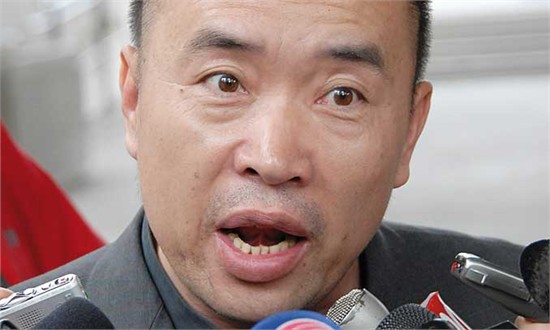Smuggler nears extradition
 0 Comment(s)
0 Comment(s) Print
Print E-mail
Global Times, July 13, 2011
E-mail
Global Times, July 13, 2011
|
 |
|
Lai Changxing [File photo]? |
One of the country's most wanted fugitives, Lai Changxing, who fled to Canada in 1999 has been arrested in Vancouver and is likely to be extradited by the end of the month, reports say.
The possible repatriation of Lai would mark the end of a 12-year dispute between China and Canada over the issue and justify their partnership in fighting crime, analysts said.
According to The Globe and Mail newspaper, police arrested Lai at his downtown Vancouver residence Thursday to stop him from fleeing before the deportation. Lai, 53, was also accused of associating with local members of the so-called Big Circle Boys organized crime gang.
Lai was the alleged mastermind of a multi-billion-dollar smuggling racket in Xiamen, Fujian Province.
From 1996 to 1999, through paying bribes and cultivating connections with local officials, Lai's gang managed to smuggle a range of goods valued at 53 billion yuan ($8.19 billion), from oil and cars to cigarettes, evading taxes of 30 billion yuan, an investigation revealed.
Authorities in Beijing have on several occasions demanded his extradition, but Canadian authorities rejected the request, claiming that Lai could face risks, such as torture, if sent back to China.
In 2007, Immigration Canada said their findings did not indicate Lai would face a risk in China, but the claim was overturned by Federal Court Judge Yves de Montigny, who ordered another risk assessment.
After four years of assessment, Immigration Canada recently determined that Lai is not at risk of being tortured in China.
Lai had been scheduled to be repatriated as early as Tuesday afternoon, but he won an interim stay of deportation Monday, giving him a chance to argue for a longer stay in a one-day Federal Court hearing July 21, The Globe and Mail reported.
If Lai loses that appeal, the tentative date for his return is July 25, the newspaper quoted Canadian Border Services Agency representative Kevin Boothroyd as saying Monday.
Huang Yunrong, editor-in-chief of the Vancouver-based Globe Chinese Press newspaper, told chinanews.com that China and Canada have stepped up their efforts in extraditing Chinese fugitives, especially economic criminals.
Lai knows that the result of the second assessment is unlikely to be overturned, Huang said.
Yang Cheng, a personal chair in International Law at the University of Saint Joseph in Macao, and also an expert witness in Lai's case, told the Global Times that this time, the chance of Lai's repatriation is very high.
"To achieve Lai's extradition, China has made a compromise by promising not to sentence him to death and to allow Canadian officials to visit Lai in a Chinese prison," Yang said.
"If the two countries can work this out, it will be a step forward in their cooperation in fighting crime. It would also serve as a good example for repatriating other Chinese fugitives hiding abroad," Yang added.
The Supreme People's Court said in 2007 that China's promise not to sentence Lai is an essential prerequisite to having him repatriated, and is the only correct option to punish crimes and safeguard the interests of the nation, the Xinhua News Agency reported.
According to a report published by the People's Bank of China in June, the number of runaway corrupt officials – mainly supervisors and managers from government departments, enterprises and institutions – has reached 16,000, resulting in the transfer of 800 billion yuan ($119 billion) in assets to other countries or regions.
The report was allegedly retracted later by the central bank from its website.
Since 2007, at least 580 fugitives accused of illegal fundraising, bank fraud, illegal transfer of funds abroad and contract fraud have gone on the run in other countries, mostly in North America and Southeast Asia, with Canada often cited as a haven for corrupt Chinese officials and fugitives, the Ministry of Public Security revealed late last year.
Zhou Rongyao, director of Canadian studies at the Chinese Academy of Social Sciences, told the Global Times that Lai's case has always been used as a leverage in Sino-Canadian relations.
"Lai's extradition will mark the end of a decade-old dispute between the two sides. Apparently, the Canadian side also compromised on its previous stance. But more importantly, they want to send a signal to fugitives that they cannot hide there anymore," Zhou said.
The Vancouver Sun newspaper reported that Lai's case has cost the federal government millions by challenging his deportation order.
During a state visit to Canada by Chinese President Hu Jintao in June 2010, the two sides signed a memorandum to work together against crime.
China has also signed extradition treaties with 37 countries, including Spain, Australia, Portugal and France, and 250 fugitives have been extradited since 2006, the China Police Daily reported in October.





